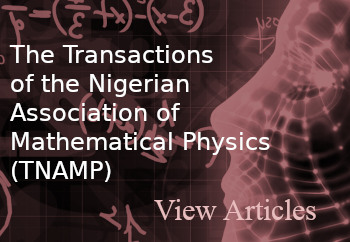PARAMETER ESTIMATION OF LINEAR REGRESSION MODEL WITH MULTICOLLINEARITY AND HETEROSCEDASTICITY PROBLEMS
Keywords:
Sample size, Proposed estimators, Error variance, Heteroscedasticity, Multicollinearity, Linear regression modelAbstract
It is very obvious that the assumption of the classical linear regression model are rarely fulfilled in real life situation. The violation of assumption of independent regressors and equal error variances leads to the problems of multicollinearity and heteroscedasticity respectively. In practice, both problems do exist together in a data set. Most of the developed existing estimators addressed each problem separately. Usually, one of the problems is handled while the other is left uncared for. Estimators to handle the two problems jointly are hardly common. There is therefore a need to develop estimators that can handle parameter estimation even when there is multicollinearity and heteroscedasticity. Consequently, this paper proposed estimators to handle parameter estimation of linear regression model having both multicollinearity and heteroscedasticity problems with the aim of identifying the most efficient (best) when both are in existence. The Ordinary least squares (OLS) estimators resulted to the weighted Least Squares model with Heteroscedasticity measures by real weight (OLSRW) and three other weights (OLSW1, OLSW2, OLSW3. Similarly, the Generalized Ridge Esimator (GRE) and the Ordinary Ridge Estimator (ORE) respectively resulted into proposed estimators GRERW, GREW1, GREW2, GREW3, ORERW, OREW1, OREW2, and OREW3. Monte carlo simulation were conducted one thousand (1000) times on a linear regression model exhibiting different levels of multicollinearity (ρ = 0.6, 0.8, 0.9, 0.99, 0.999, 0.9999 ) with various known natures of heteroscedasticity, error variances (???????????? = ????. ????????, ????. ????, ????????, ????????????, ????????????) at seven levels of sample size (n=15, 20, 30, 50, 100, 250, 500). The comparison of the estimators were done based on the their finite sampling properties especially the mean squares error, and were compared at each level of multicollinearity, heteroscedasticity, error variance and sample sizes. Ranking of the estimators were also conducted on the basis of their performances using the criteria. The results of investigation revealed that with known eteroscedasticity structures present with multicollinearity problem, the proposed GRERW estimator is best. Also, when there is problem of multicollinearity with known natures of heteroscedasticity but assumed tobe unknown, the proposed estimator GREW2 performed better.
Downloads
References
Ekum, M.I., Akinmoladun, O.M., Aderele, O.R. and Esan, O.A. (2015). Application of Multivariate Analysis on the effects of World Development Indicators on GDP per capita of Nigeria (1981-2013). International Journal of Science and Technology (IJST), 4(2):254-534.
Gujarati, N. D, Porter, C.D. and Gunasekar S. (2012) ’ Basic Econometrics.’ (Fifth Edition). New Delhi: Tata McGraw-Hill.
Neter, J. and W. Wasserman.(1974) ’Applied Linear Model.’ Richard D. Irwin, Inc
Fomby, T. B., R. C. Hill and S.R. Johnson. (1984) ‘Advanced econometric methods.’ Springer- Verlag, New York, Berlin, Heidelberg, London, Paris, Tokyo.
Ayinde, K., Lukman, A. F. and Arowolo, O.T. (2015) ‘ Combined parameters estimation methods of linear regression model with multicollinearity and autocorrelation. Journal of Asian Scientific Research, 5 (5), 243 - 250.
Lukman, A. F., Osowole, O. L. and Ayinde, K. (2015) ‘ Two stage robust method in a linear regression model’. Journal of Modern Applied Statistical Methods, 14 (2), 53-67.
Lukman, A. F. and Ayinde, K. (2016) ‘ Some improved classification-based ridge parameter of Hoerl and Kennard estimation techniques’. West African Journal of Industrial and Academic Research, Vol. 16, (1), 72-79.
Chatterjee, S., A. S. Hadi and B. Price. (2000) ’Regression Analysis by Example.’ 3rd Edition, A Wiley- Interscience Publication. John Wiley and Sons.
Hoerl, A. E and Kennard, R.W. (1970) ‘Ridge regression: Biased estimation for non-orthogonal problems.’ Technometrics, 12, 55-67.
McDonald, G. C. and Galarneau, D. I. (1975) ‘A monte Carlo evaluation of some ridge-type estimators’. Journal of the American Statistical Association, 70 (350), 407-412.
Lawless, J. F. and Wang, P. (1976) ‘A simulation study of Ridge and other Regression Estimators’. Communications and Statistics, A5, 307-323.
Wichern, D. and Churchill, G. (1978) ‘A comparison of ridge Estimators’. Technometrics, 20, 301-311.
Kibria, B. M. (2003) ‘Performance of Some New Ridge Regression Estimators’. Communications in Statistics- Simulation and Computation, 32 (2), 419-435.
Kibra, B. M. G. and Shipra, B. (2016) ‘ Some ridge regression estimators and their performances’. Journal of Modern Applied Statistical Methods, 15 (1), 206- 231.
Kibra, B. M. G. and Lukman, A. F. (2020) ‘A new ridge-type estimator for the linear regression model: Simulations and Applications. Hindawi Scientifica.
Massy, W. F. (1965) ’Principal component regression in exploratory statistical research.’ Journal of the American Statistical Association, 60, 234-246.
Tabakan, G. and Akdeniz, F. (2010) ’Difference-based ridge estimator of parameters in partial linear model.’ Statist,.Pap., 51, 357-368
Asimi, Kayode and Kehinde J. of NAMP Tabakan, G. (2013) ’Performance of the difference-based estimators in partially linear models.’ Statistics, 47, 329-347.
Naes, T. and Marten, H. (1988) ’Principal component regression in NIR analysis : View point, background details selection of components.’ Journal of Chemometrics, 2, 155-167.
Liu, K. (1993) ‘A new class of biased estimate in linear regression.’ Communications in Statistics- Theory and Methods, 22, 393-402, MR1212418.
Khalaf, G. and Shukur, G. (2005) ‘ Choosing ridge parameters for regression problems. Communications in Statistics-Theory and Methods, 34, 177-1182.
Dorugade, A. V. and Kashid, D. N. (2010) ‘ Alternative method for choosing ridge parameter for regression.’ International Journal of Applied Mathematical Sciences, 4 (9), 447- 456.
Lukman, A. F., Ayinde, K. and Ajiboye, S. A. (2017) ‘ Monte- Carlo study of some classification-based ridge parameter estimators’. Journal of Modern Applied Statistical Methods, 16 (1), 428-451.
Ayinde, K., Lukman, F., Samuel, O. O. and Ajiboye, S. A. (2018) ‘ Some new adjusted ridge estimators of linear regression model’. Internation Journal of Civil Engineering and Technology, 9 (11), 2838- 2852.
Fayose, T. S. and Ayinde, K. (2019) ‘Different forms biasing parameter for generalized ridge regression estimators’ International Journal of Computer Applications, Vol. 181, 37, 21- 29.
Aitken, A .C . (1935) ‘On least squares and linear combination of observations. ’Proceedings of the royal statistical society of Edinburgh, 55, 42-48.
Markov, A. A. (1900) ’Wahrscheinlichkeitsrechnug.’’ Leipzig; Tuebner.
Maddala, G. S. (2002) ’Introduction to Econometrics.’’ 3 rd Edition, JohnWiley and Sons Ltd., England.
Cochran, W. G. and Carroll, S.P. (1953) ‘A sampling investigation of the efficiency of weighting inversely as the estimated variance.’ Biometrics, 9 (4), 447-459.
Park, R. E. (1966) ’ Estimation with heteroscedastic error terms.’’ Econometrica, 34, 888-892.
Rao, C.R. (1970) ’Estimation of heteroscedasticity variances in linear models’. Journal of the American Statistical Association 65, 161-172.
Horn, S. D, Horn, R.A. and Duncan, D.B. (1975) ‘Estimating heteroscedastic variances in linear model.’ Journal of the American Statistical Association, 70, 380-385.
Magnus, J. R. (1978) ’Maximum likelihood estimation of the GLS model with unknown parameter in the disturbance covariance matrix.’’ Journal of Econometrics, 7, 281-312.
Balasiddamuni, P., Prakash, K., Rao, K., Prasad, A., Abbaiah, R. and Rayalu, G. (2013 ) ‘A minimum quadratic unbiased estimation (MINQUE) of parameters in a linear regression model with spherical disturbances.’ International Journal of Scientific and Technology Research, 2 (5), 135-138.
Shin, H. C .and Jibum Kim. (2014) ’Weighted least squares estimation with simultaneous consideration of variances and sampling weights.’ Proceedings of the survey research methods section, the American Statistical Association, 2972- 2978.
Fuller, W. A. and Rao, J .N. K. (1978) ‘Estimation for a linear regression model with unknown diagonal covariance matrix’. Annals of Statistics, 6 (5), 1149-1158.
Carroll, R. J. and Ruppert, D.(1988) ‘Transformation and weighting in regression.’ New York, NY: Chapman & Hall.
Gibbons, D. G. (1981) ‘A Simulation Study of Some Ridge Estimators’. Journal of the American Statistical Association, 76 (373), 131-139.
Lukman, A. F., Ayinde, K., Binuomote, S. and Clement, O. A. (2019b) ‘ Modified ridge-type estimator to combat multicollinearity: Application to chemical data. Journal of Chemometrics, 33 (5), 3125- 3132.
Glesjer, H. (1969) ‘A new test for heteroscedasticity.’ Journal of the American Statistical Association, 64, 316- 323.
Bruesch, T. S. and Pagan, A. R. (1979)‘ A Simple test of heteroscedasticity and random coefficient variation.’ Econometrica, 47, 1287 – 1294.
Box, G. E. P. and Hill, W. J. (1974) ‘Correction inhomogeneity of variance with power transformation weighting’.
Technometrics, 16 (3), 385-389.
Journal of the Nigerian Association of Math
Downloads
Published
Issue
Section
License
Copyright (c) 2023 The Journals of the Nigerian Association of Mathematical Physics

This work is licensed under a Creative Commons Attribution-NonCommercial-ShareAlike 4.0 International License.




